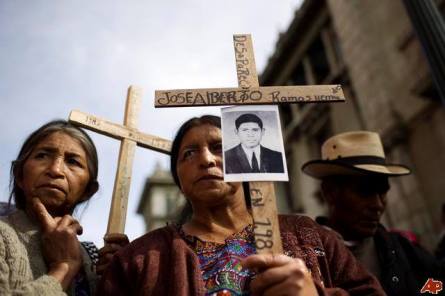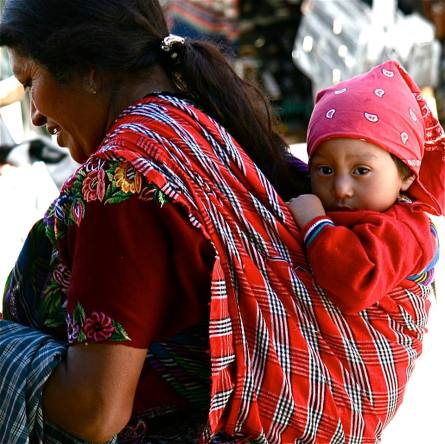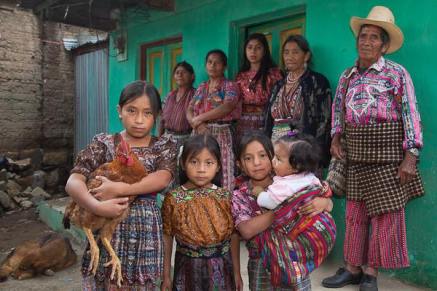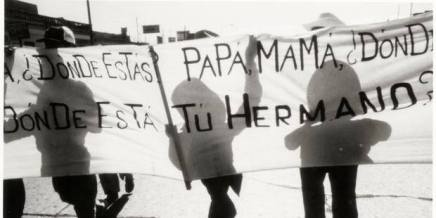This began as a quick ‘like and share’ post on Facebook. In an effort to ‘Raise Awareness’ in an open group of the same name, I began to write about Rosalina Tuyuc, a humanitarian activist from Guatemala. It soon became apparent to me when I reached 400…500…600 words that this was a little bit of overkill for a Facebook post! So, here we are. And so I begin.
It is now widely acknowledged, following years of denial from various government parties and representatives, that Guatemala, arguably one of the most beautiful countries in Central America, suffered a thirty-six year civil war, from 1960 until 1996. It is estimated that up to 250,000 were killed or “disappeared”, and aside from the conflict between the government and rebel forces, there were in fact several instances of genocide perpetrated by the military or other government supported groups against the civilian population; or to be more specific, the indigenous Maya peoples.
Yes, you read it correctly, the Maya peoples. Mayan people are not an ancient civilization, long extinct. There were in fact around 6 million Maya living in South Mexico and North Central America at the start of the 21st century. The term ‘Maya’ embraces many distinct populations who share some degree of cultural and linguistic heritage.
The indigenous people of Guatemala suffered racial discrimination, and social and economic injustice. The coup of 1954 against elected President Jacobo Arbernz installed a military government and reversed some really positive reforms, for example the redistribution of unused land to peasants for farming. It was a catalyst for the subsequent thirty-six year long civil war.
Many youths from rural communities were forcefully recruited into the military, whereas children in urban areas were allowed to attend school, a clear act of discrimination. The result was that many of these young people were fighting their own people, their own towns, because they had no choice.
An army officer was quoted in the New York Times of 18 July 1982 as telling an audience of indigenous Guatemalans in the town of Cunén that: “If you are with us, we’ll feed you; if not, we’ll kill you.”
I recently watched a film, from the Historias Debidas series for ‘Canal Encuentro’ in Argentina, which showed an interview with Rosalina Tuyuc, born in San Juan Comalapa, Guatemala in 1956 and whose story is quite harrowing. There is so little awareness of this incredible person outside of her own country that I can’t find any footage with English subtitles, so I am going to tell you a little of what she describes in this fascinating interview.
The Mayan widows of Guatemala
Rosalina Tuyuc is the founder of Conavigua (a national foundation of Guatemalan widows), ex-president of the PNR (national program for compensation), and a human rights activist. She has been awarded several International prizes, including the 2012 Niwano Peace Prize from Japan, in recognition of her extraordinary and dogged work for peace as a courageous human rights activist and leader.
During the genocide of President Efraín Ríos Montt (the first Latin American dictator to be convicted of genocide) in 1982, her father disappeared along with more than 1,400 indigenous Ixil Mayans who were also killed or kidnapped. This was followed by the disappearance of her husband during the rule of another military dictator,Mejia Victores, in 1984. Rosalina was left both an orphan and a widow with two infant children, unable to work and afraid for her life, she began to believe there was nothing to fight for.
When the military came to take her and her children to go to ‘where her husband was’, she saw that she was facing a genuine choice between life and death. She chose life and in order to save herself and her children she denied her identity. This is when she began her humanitarian efforts, realising that there was something to fight for, which began with the formation of Conavigua.
Rosalina tells that after the disappearance of her husband she tried to find work, and worked briefly as a nurse, but because she took her baby to work with her she was dismissed. She goes on to describe how, for the Mayan people, it is very common place to work with your baby fixed to your back, in the markets, helping the husbands, supporting the community, and this is something that is not understood by ‘white’ society.
From then on, life was still no walk in the park. Rosalina’s voice was at the core of the people’s fight which inevitably made her a target. She received many death threats and narrowly escaped kidnap several times.
In order to safeguard her children they remained under the protection of Conavigua, which she founded. She describes that when they were young they didn’t fully understand why she had to ‘fight’ and living so frequently away from her, they were somewhat resentful.
However, as they grew older and began to join her in visits to rural towns where she would give speeches, they began to see and understand her reasons for fighting and the love the people had for her. Her oldest son was motivated to strengthen his efforts and often works at her side.
Sadly, to this day, there exists a lot of racism in Guatemala. Rosalina informs us that the miniscule representation of Mayans in organizations such as banks, the army and congress, are not permitted to dress in their traditional clothing. It seems to me and certainly to them, to be a tactic to repress their identity.
What impresses me so much about Rosalina, and I imagine part of the reason she has overcome so much, is her overwhelming positivity. In the face of all that has happened, the genocides, ethnocides, wars and earthquakes, these vibrant, gentle people remain; their ways, their traditions, their beautiful, nature-embracing ‘one world’ message is clear and strong.
To understand more I spoke to my friend Beatriz Barrera, a sociologist from Guatemala who has been living in Buenos Aires since the early 90′s. Beatriz, who lived her entire childhood and early adulthood in wartime, told me how many of her father’s friends have disappeared over the years, and how members of her family had to hide from the military who were going from house to house beating people.
As a student, along with others, she wanted to take action but began to receive anonymous threats. At the time there were many threatening speeches broadcasted on TV to the general public. She says that although currently life is less dangerous, not much else has changed. There is still racism and inequality, and for this reason the work of Rosalina remains crucial.
“Rosalina’s work is ethical; she keeps working with her group, defending the environment and their culture. Since the ILO (International Labour Organization) declared Article 169 in September 2007, the Mayans are becoming much more aware of their rights” explained Beatriz. “However this is not good for an economical sector that are used to seeing them as slaves.”
Beatriz added that because of the peace act signed in 1996 (in which not one indigenous leader was included), the rest of the world considers that ‘everything is resolved.’ But as we have discovered in the course of this article, the Mayan and indigenous people continue to battle their government for some very basic rights; including those of land ownership and exploitation of said land by agricultural and mining companies. Rosalina’s two brothers were very active in defending these rights.
A year ago, under the right-wing party headed by Otto Perez, one of Rosalina’s brothers was murdered and in early January this year, her sole remaining brother’s life was also taken.
The heartache is far from over and the fight continues. The indigenous people of Guatemala have suffered long and hard but their incredible faith, spirit and vitality will certainly one day gain them all that they deserve; equality, recognition and peace.
Written by Elizabeth Monaghan
Guest Writer
British Guest Writer Elizabeth Monaghan currently lives and works in Buenos Aires, Argentina.
This post was originally published at http://thepianosachronicle.wordpress.com/2014/01/28/mayans-war-a-voice-of-hope/ and was shared by the Author’s permission.
Our authors want to hear from you! Click to leave a comment
Related Posts










